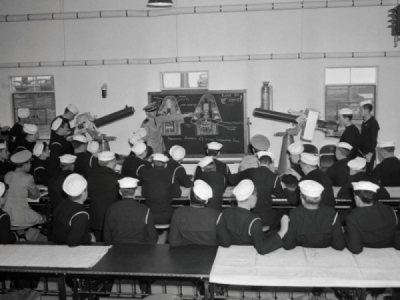
Posted on March 26, 2020
United States Merchant Mariners suffered the highest rate of casualities of any service in World War II. According to one estimate, one of every 26 mariners died and as many as 8,000 perished in total — while more than 600 became prisoners of war without the protection of prisoner-of-war status.
In long overdue recognition, President Trump has now signed into law a bill to award the Congressional Gold Medal to those United States Merchant Mariners who served as the fourth arm of our national defense during World War II.
These valiant civilian mariners provided the unbroken pipelines that got America’s domestic production to its fighting forces and allies overseas, providing equipment, fuel, food, assorted commodities and raw materials to every corner of the globe and every theater of war.
Statistics alone don’t capture the sufferings of our merchant mariners, who struggled to survive in crowded lifeboats or on flimsy rafts among flotsam in thick oil slicks. During the war, more than 800 vessels were sunk.
Nor do mere numbers capture the parched lips and swollen tongues from lack of fresh water in the burning tropical sun or the frozen limbs of those adrift in the North Atlantic and Barents Sea.
While the brutality of Nazi Germany’s U-boat attacks left many abandoned at sea to their gloomy and lonely fates, these doomed mariners may have been lucky compared to those trapped in the engine rooms of their sinking ships. In the chaos and fog of war, men faced scalding steam from ruptured boilers and steam lines as damaged hulls raced to inevitable crashes with the seabed.
These brutalities on the high seas claimed not just seasoned mariners but also our very youngest. Over the course of the war, 142 United States Merchant Marine Academy students were lost at sea while training aboard ships, giving it the sobering distinction among the nation’s five service academies as the only one to have a battle standard.
One of those lost was young engineer cadet Edwin O’Hara. On Sept. 27, 1942, O’Hara’s ship, the SS Stephen Hopkins, came under attack from two German commerce raiders. Despite being massively outgunned, the United States Merchant Mariners chose to fight these surface vessels. A vicious bombardment left the Hopkins dead in the water and aflame, with the crew manning its lone 4-inch gun dead.
To help save lives, O’Hara rushed to man the gun alone, fired its remaining five shells, and scored hits on both German vessels. As his crewmembers escaped on life rafts, O’Hara went down with the ship.
For his bravery, he was posthumously awarded the Merchant Marine Distinguished Service Medal, the highest award for Merchant Marine personnel, while his name also adorns the United States Merchant Marine Academy’s main athletic building.
The awarding of the Congressional Gold Medal, so richly deserved and so long overdue, must not just celebrate the heroism of a branch of service too often lost in the shadows of the Army, Navy, Marines, Coast Guard and Air Force.
This Gold Medal should also serve the greater purpose of bringing attention to a branch of service that continues to be largely neglected.
Today, as the United States military continues to rely on its merchant-marine fleet to move its supplies around the world, fewer than 200 of the world’s 40,000-plus large, oceangoing commercial vessels fly the American flag. A declining number of US commercial vessels means fewer US-flagged ships and possibly fewer US-credentialed mariners available for sealift in times of emergencies.
Foreign competitors know full well that one way to impair the US armed forces is to attrit in contested waters the number of US-flagged merchant ships and crews.
Let this Congressional Gold Medal not only celebrate some of the most unsung heroes of World War II; let it also reawaken our interest in promoting US-flagged ships and credentialed merchant seamen and strengthening our shipyards and broader defense industrial base.
Such a result would be a truly lasting tribute to those World War II merchant mariners who defended freedom then and a broad salute to our future merchant mariners who will defend us in the tomorrows to come.
Peter Navarro is assistant to President Trump for trade and manufacturing policy.
Source: nypost





